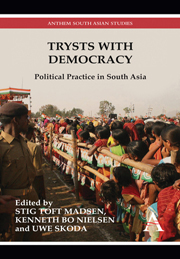Book contents
- Frontmatter
- Contents
- List of Tables
- List of Abbreviations
- Glossary
- Map of South Asia
- Acknowledgements
- 1 Introduction
- Part One Theoretical Issues
- Part Two India
- 4 Ajit Singh S/O Charan Singh
- 5 A Princely Politician in an Indigenised Democracy: A Raja and his Electoral Situation in Rural Orissa 2004
- 6 A Political Breakthrough for Irrigation Development: The Congress Assembly Campaign in Andhra Pradesh in 2003–2004
- 7 Congress Factionalism Revisited: West Bengal
- Part Three Beyond India
- About the Editors
- About the Contributors
6 - A Political Breakthrough for Irrigation Development: The Congress Assembly Campaign in Andhra Pradesh in 2003–2004
from Part Two - India
Published online by Cambridge University Press: 05 March 2012
- Frontmatter
- Contents
- List of Tables
- List of Abbreviations
- Glossary
- Map of South Asia
- Acknowledgements
- 1 Introduction
- Part One Theoretical Issues
- Part Two India
- 4 Ajit Singh S/O Charan Singh
- 5 A Princely Politician in an Indigenised Democracy: A Raja and his Electoral Situation in Rural Orissa 2004
- 6 A Political Breakthrough for Irrigation Development: The Congress Assembly Campaign in Andhra Pradesh in 2003–2004
- 7 Congress Factionalism Revisited: West Bengal
- Part Three Beyond India
- About the Editors
- About the Contributors
Summary
Introduction
In the south Indian state of Andhra Pradesh (AP), following the victory of the Congress Party in the Assembly elections of 2004, Chief Minister Y. S. Rajasekhara Reddy (YSR) led his government in an effort of irrigation development that was unusual compared to the activities in other states in India at the time. YSR and his government promoted a range of programs aimed at the agrarian sector, and the supply of water for agricultural production and for domestic use received particularly high priority. YSR's intention was to extend irrigation cover to ten million acres of land by 2014 (The Hindu 2009) and to that end the state had by 2009 spent Rs 75,000 crore (Anon. 2009, 5). One might argue that such an effort was only ‘natural’, since two of the three major areas in the state, Telangana and Rayalaseema, were semi-arid zones and had suffered from drought during the three years previous to the election. However, Telangana and Rayalaseema had long been vulnerable to scarcity of water and had experienced drought before (even if the incidence appeared to villagers to be increasing); and despite this vulnerability, no large-scale irrigation development such as that planned by the YSR government had been carried out in the state at any time since Independence. Why did this extraordinary focus on irrigation development start in 2004 under a Congress Party government?
- Type
- Chapter
- Information
- Trysts with DemocracyPolitical Practice in South Asia, pp. 135 - 156Publisher: Anthem PressPrint publication year: 2011
- 5
- Cited by



